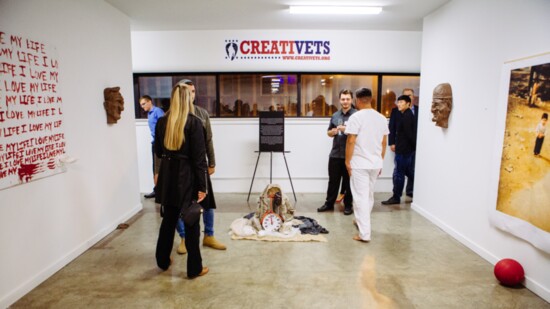Military veterans are among the toughest bunch of individuals in the world: selflessly stepping up, often giving life and limb in service to our nation. But when it’s time to come home, the transition can be one of their greatest challenges.
Richard Casper knew this all too well. A Marine Corps veteran and Purple Heart recipient, Casper returned home with a traumatic brain injury and post-traumatic stress after serving in Iraq. He had survived four IED blasts and witnessed the death of a close friend, but an “aha” moment during a community college art course has resulted in healing for veterans across the country.
“My teacher taught me how to use color in different ways to evoke emotion,” Casper says. “I had a photo of me at my friend’s grave, and instead of making the grass green, he encouraged me to use a color that didn’t make sense. I did everything red, not knowing why. But students who didn’t know my story saw it was different and started talking about it. That was the first time I thought ‘Wow, they understood me for a second.’”
This led Casper to explore conceptual art further, and he turned to ceramics.
“I remember just getting lost in clay and not even knowing what I was building,” he adds. “Six straight hours went by, and I realized I didn’t even think about war or remember I had all my issues.”
He soon realized he was nearly back to his normal self after learning to repurpose his memories and experiences into art. He knew he needed to share this with the world, and CreatiVets was launched.
CreatiVets is a nonprofit utilizing various forms of art to help veterans cope with service-related trauma by allowing them to transform their stories into an art form that can inspire healing. From painting to 3D printing, wood sculptures, sewing, performance art, graphic design, and even songwriting, a plethora of programs exist tailored to creative interests. Every program focuses on two goals: therapeutic expression and practical skill-building.
“We incorporate skills like photography or graphic design that they might use as a job later,” Casper adds. “We pay for everything because many aren’t financially stable.”
CreatiVets partners with renowned institutions like the School of the Art Institute of Chicago and the University of Southern California, and works with some of Nashville’s most prominent songwriters to help veterans create music. They also host pop-ups at events and festivals around the country to not only spread the word, but to change a few lives unexpectedly along the way.
“At a country festival, a veteran walked up and didn’t want to do it at first, but his wife talked him into it. He eventually wrote a song, and it was awesome,” Casper recalls. “Two weeks later, he showed up at another festival, saying he only bought tickets to thank us. A whole year later, he’s our mentor at that program and he spoke at our gala.”
Tim Brown, CreatiVets’ art director, had long turned to art as an outlet. He served in both Afghanistan and Iraq, and found solace in ceramics upon returning home.
“We always start in ceramics, one of the most utilized forms of art therapy,” Brown says. “At its core, it’s a lot easier to work with a ball of clay and have a conversation. You play with it and by the end of the conversation, you’ve probably created something. And as humans, we’ve been playing with mud forever!”
It’s not surprising that encouraging veterans to turn to art can be a tough sell, but Casper says excitement outweighs anxiety and depression. The program offers not only a creative outlet, but also financial support (covered expenses include tuition, food and lodging), a battle buddy, and hope when sometimes, there is none.
“They aren’t artists; they’re veterans,” Brown says. “It’s hard to convince a bunch of war-torn grunts that art is the answer, but we show them we had a similar experience.”
While art has a huge impact on veterans, it’s beneficial for all. Casper encourages anyone facing anxiety or depression to pick up an art form. Any art form. Pick up that guitar, order a paint-by-number kit, start writing.
While the organization accepts monetary donations, Casper shares that streaming their veterans’ music not only helps them financially, but also helps civilians understand their struggles and stories more thoroughly.
